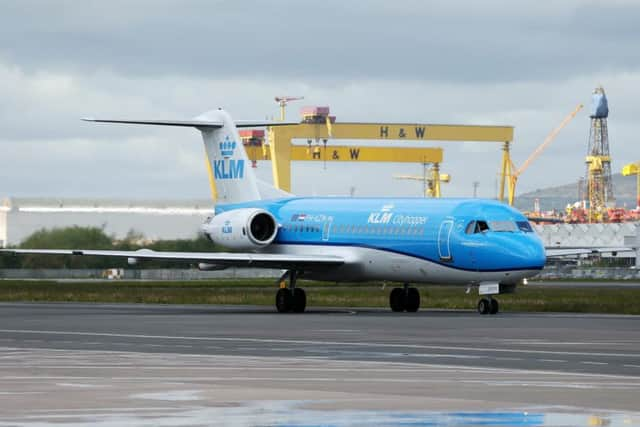Fear of a '˜no-deal' Brexit is like Millennium Bug hysterics
and live on Freeview channel 276
When the EU Withdrawal Agreement comes before Parliament in a few weeks, MPs will be asked to accept the deal on offer – or to risk ‘no deal’.
The latter has been almost universally described in the media as “catastrophic”.
Advertisement
Hide AdAdvertisement
Hide AdOne Cabinet minister has been quoted as being “terrified” of the prospect. A former minister recently declared that under no circumstances could he support a Brexit based on no deal.


At the same time, the Withdrawal Agreement on offer is clearly unacceptable to many.
The government has promised to lock the UK into a customs union of uncertain legal basis, and Northern Ireland also into the single market – in both cases until an alternative arrangement is agreed.
Alternatives will depend on EU agreement and they are unlikely to agree to anything weaker on Northern Ireland. These measures are apparently all aimed at securing frictionless borders at roll-on-roll-off ports as well as in Ireland.
Advertisement
Hide AdAdvertisement
Hide AdBut no work has been done to look at alternatives to remaining in a customs union in order to achieve frictionless trade.


Customs experts have been ignored. Only last Monday, speaking to the Commons Northern Ireland Affairs Select Committee, the previous head of the World Customs Association, Lars Karsson, clarified and reinforced his frequently expressed view that modern technology can do the job.
Hans Maessen, a Dutch customs specialist, also testified that technical solutions could work to ensure no hardening of the Irish border.
The heads of UK and Irish customs have also both asserted that invisible borders are now possible.
Advertisement
Hide AdAdvertisement
Hide AdThis can all be achieved with existing technical solutions, and in compliance with the EU’s Union Customs Code.
Together with modern customs arrangements and the latest technology, it is clear that a Canada-style free trade agreement will be sufficient for UK needs.
Zero tariffs and a regulatory cooperation chapter in a free trade agreement will protect companies and jobs from excessive disruption and modern technology will avoid hold-up at borders.
In the Irish case, no new infrastructure will be needed at all.
Advertisement
Hide AdAdvertisement
Hide AdBrussels wants an agreement – not least to secure its £39 billion without protracted court action – but continues to insist on an Irish backstop.
If it continues to demand an excessive backstop it will risk no deal, which would in turn mean a hard border at least on the southern side of the border.
In other words, the UK has some bargaining clout to get a different deal but only if the prospect of no deal has credibility.
The much-feared 20-mile lorry-jams in the event of no deal, already prompting diggers to begin work on expanding the M26, come solely from a danger that French customs will instigate unnecessary checks at Calais and elsewhere leading to congestion on ferries and hold-ups in Kent.
Advertisement
Hide AdAdvertisement
Hide AdIf the UK undertook not to alter any product regulations through the transition period, there would be no need for regulatory checks during this period – but checks might be undertaken anyway due to a strict and purblind application of EU rules.
This would be equivalent to sanctions on a hostile regime, albeit defended by the EU on grounds of normal procedure.
It is politically unlikely to happen or to last for any stretch of time, especially if the UK threatened retaliation on EU exporters.
Prohibition on landing rights and refusal of certification on aircraft, cars, or vehicle parts come under the same category, not least because much of French tourism depends on flights from the UK.
Advertisement
Hide AdAdvertisement
Hide AdSeveral French regional airports derive close to 80% of their traffic from UK-owned airlines and local tourism would be ruined by prohibitions.
In short, strict and bloody-minded application of EU rules could lead to severe problems, but again is politically unlikely.
Jose Manual Barroso, former president of the European Commission, recently said that the most important aim of the Brexit negotiations should be to avoid deep and lasting resentment.
While wild threats will of course feature as bargaining gambits, one would expect EU pragmatism to avoid hugely provocative and inflammatory actions which are easily avoided by hastily agreed side deals.
Advertisement
Hide AdAdvertisement
Hide AdTo do these, French President Emmanuel Macron is taking on extra powers.
The Irish foreign minister has said that, “if it looked as though Britain were heading towards a no-deal departure from the European Union then direct discussions on how to avoid a hard border would be required”.
Like the Millennium Bug, ‘no deal’ lodges itself in the mind as a fear of the unknown.
Our current political predicament means that we need to quickly unpack the dangers and provide a rational assessment of the risks.
We have some good bargaining chips for a new negotiation.
Advertisement
Hide AdAdvertisement
Hide AdLet’s use them in the national interest to avoid this unsatisfactory Withdrawal Agreement.
• Dr Graham Gudgin is chief economic adviser to the think-tank Policy Exchange, an honorary research associate at the University of Cambridge, and visiting professor at the University of Ulster.
• Alexander Downer is a former Australian foreign minister and former High Commissioner to the UK, and former leader of Australia’s Liberal Party